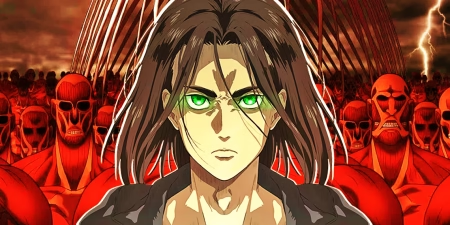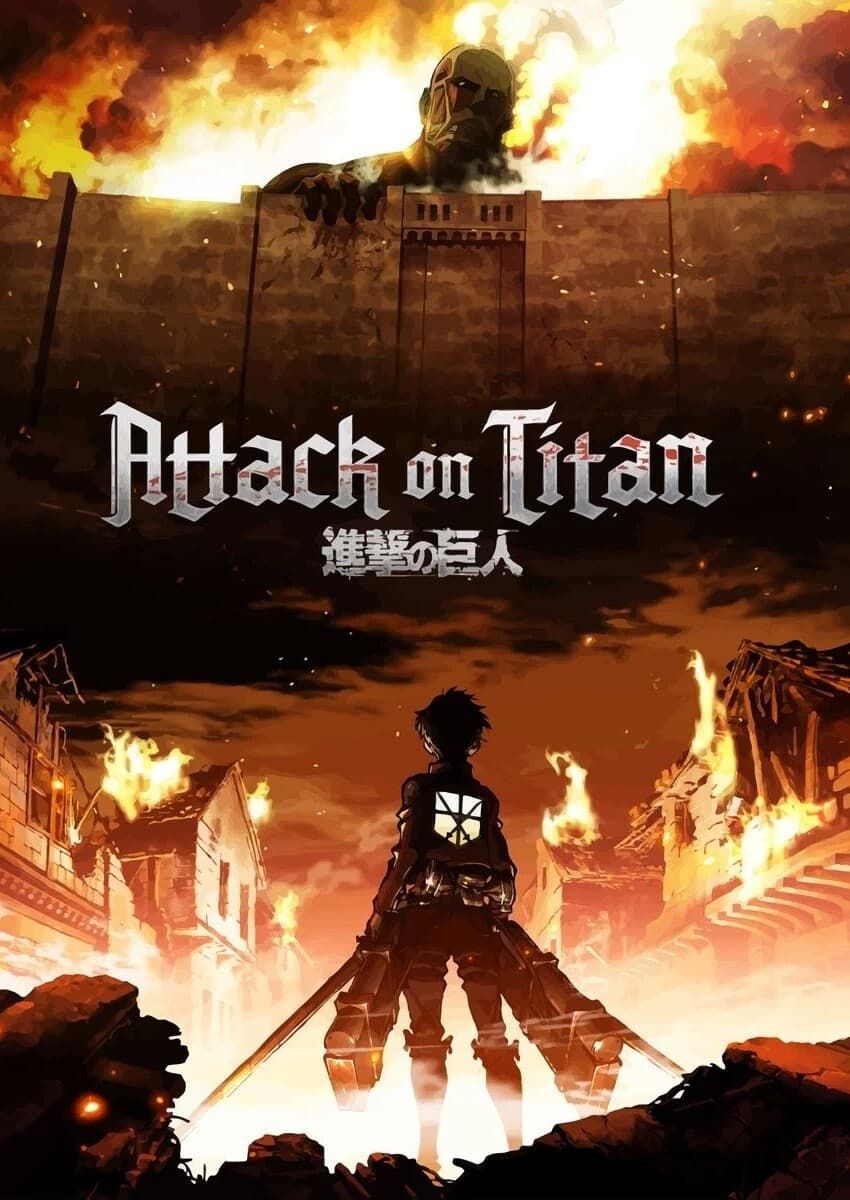Attack on Titan: Is Eren a Hero or a Villain?
- 05-Mar-2024, 03:54
- 0 Comments
- 17 views

Eren Yeager's journey in Attack on Titan indeed began with the classic hero archetype. From the very start, viewers witnessed his determination to join the Survey Corps and fight against the Titans that threatened humanity. His desire for freedom and revenge for the loss of his mother drove him forward, embodying the spirit of a traditional hero.
As the series progressed, Eren's character underwent significant development, shaped by the harsh realities of the world he lived in and the traumas he experienced. His encounters with the Titans, the revelations about his own abilities, and the discovery of the truth behind the walls all contributed to his evolving mindset.
Eren's transformation from a hero in the making to a complex and morally ambiguous character is a testament to the depth of Hajime Isayama's storytelling. As he grappled with the complexities of his role in the larger conflict and the sacrifices necessary to achieve his goals, Eren's actions became increasingly controversial.
The beauty of Eren's character lies in his complexity. While some may view him as a hero driven by noble intentions, others see him as an anti-hero whose methods are morally questionable. Ultimately, the portrayal of Eren as neither purely good nor purely evil adds layers of depth to his character and challenges viewers to reconsider their perceptions of heroism and villainy.
In the end, Eren Yeager defies easy categorization, leaving fans to wrestle with the complexities of his character long after the series has concluded.
Eren's traumatic past indeed played a crucial role in shaping his character and fueling his motivations. The loss of his family and witnessing his mother's death at the hands of a Titan instilled in him a deep-seated desire for revenge and a fervent determination to eradicate the Titans threatening humanity.
Similar to protagonists like Naruto, Eren's initial arc reflects the classic hero's journey archetype, where he sets out to prove himself and achieve his goal of becoming the strongest soldier. His quest for strength and his unwavering resolve to confront the Titans outside the walls echo themes of perseverance and determination commonly found in shonen manga.
However, what sets Eren's journey apart is the complexity of his character and the moral ambiguity surrounding his actions. As the series progresses, Eren's motivations evolve beyond simple vengeance, delving into deeper themes of freedom, sacrifice, and the cycle of violence.
The revelation of Eren's true identity as the Attack Titan further complicates his character, blurring the lines between heroism and villainy. His willingness to commit extreme acts of violence, including sacrificing innocent lives, raises questions about the morality of his actions and the justifiability of his goals.
Eren's past trauma serves as a driving force behind his character development, but it also adds layers of complexity to his journey. As he grapples with the consequences of his choices and the weight of his responsibilities, Eren's character becomes increasingly nuanced, challenging both the audience's perceptions and his own moral compass.
Ultimately, Eren's journey is a testament to the intricacies of human nature and the complexities of the human psyche, reminding us that even the most heroic of protagonists can be driven to dark places by the traumas of their past.
The revelations about his father's actions, coupled with the betrayals and uncovering of truths about the world, indeed had a profound impact on Eren's psyche. Touching Historia and accessing memories from previous Titan shifters, as well as glimpses of the future, further added layers of complexity to his character.
For Eren, the realization that the world beyond the walls was far more complex and nuanced than he initially believed shattered his simplistic worldview. He came to understand that achieving true freedom required more than just defeating Titans; it involved confronting deep-seated systemic issues and challenging the status quo that perpetuated cycles of violence and oppression.
The burden of responsibility weighed heavily on Eren as he grappled with the knowledge that his actions could determine the fate of humanity. The weight of this realization, combined with the personal sacrifices he had to make, fundamentally changed him, pushing him further down a path of moral ambiguity and ethical dilemmas.
Eren's character arc serves as a cautionary tale about the dangers of idealism and the consequences of pursuing one's goals without fully understanding the implications of their actions. His journey is a testament to the complexities of morality and the human condition, highlighting the internal struggles and conflicts that arise when faced with difficult choices and uncertain futures.
Ultimately, Eren's transformation from a vengeful youth seeking revenge to a conflicted protagonist grappling with the complexities of freedom and responsibility is a testament to the depth and intricacy of his character. His journey serves as a central theme of "Attack on Titan," exploring the complexities of human nature and the moral dilemmas inherent in the pursuit of justice and freedom.
Eren's descent into a more morally ambiguous and ultimately villainous role was indeed driven by a complex combination of factors, including his knowledge of future events and his sense of duty and love for Paradis Island. The revelation of his future memories, obtained through touching Historia's hand, undoubtedly played a significant role in shaping his actions and mindset.
Knowing the future, especially the atrocities he would commit as the founder of the Rumbling, likely weighed heavily on Eren's conscience and contributed to his detachment from those around him. This newfound awareness may have created a sense of fatalism in Eren, leading him to believe that his actions were inevitable and that attempting to change the course of events would ultimately be futile.
Furthermore, Eren's deep-rooted love for Paradis Island and his desire to protect his homeland also played a pivotal role in his transformation. He was willing to do whatever it took to ensure the survival of his people, even if it meant resorting to extreme measures and sacrificing innocent lives in the process. This sense of duty and responsibility, coupled with his knowledge of the future, likely fueled his determination to carry out the Rumbling despite its devastating consequences.
Eren's characterization as a morally complex and ultimately tragic figure highlights the nuanced exploration of morality and the human condition within "Attack on Titan." His journey serves as a compelling examination of the complexities of duty, sacrifice, and the consequences of wielding power, showcasing the blurred lines between heroism and villainy and the inherent flaws and contradictions within human nature.
Eren Yeager's journey and transformation throughout "Attack on Titan" reflect the harsh realities of war and the complexities of moral decision-making in times of conflict. His experiences in Marley territory serve as a stark reminder of the deep-seated hatred and animosity that exists between different factions, particularly between the Eldians and the rest of the world.
Despite his initial hopes of finding an alternative solution, Eren comes to the realization that the enmity and atrocities committed by Marley against Eldians cannot be reconciled through diplomatic means. This realization likely contributes to his belief that his actions, as drastic as they may be, are the only viable option to ensure the survival and freedom of his people.
Eren's character embodies the concept of the "necessary evil" – someone who is willing to commit morally questionable acts for what they perceive to be the greater good. His decision to initiate the Rumbling and unleash the power of the Titans upon the world is driven by his conviction that it is the only way to protect Paradis Island and its inhabitants from annihilation.
Hajime Isayama's portrayal of Eren as a complex and morally ambiguous figure challenges the audience to grapple with difficult questions about the nature of morality, justice, and the human capacity for both good and evil. Eren's character serves as a reflection of the harsh realities of war and the moral dilemmas faced by individuals caught in the midst of conflict.
Eren Yeager's character indeed embodies the complexity of morality and the harsh realities of survival in a world plagued by war and oppression. Throughout "Attack on Titan," Eren navigates a morally ambiguous path driven by his unwavering commitment to protect Paradis Island and its people.
As you mentioned, Eren's actions blur the lines between heroism and villainy, reflecting the gray areas of human nature. His decision to unleash the power of the Titans through the Rumbling is motivated by his belief that it is the only way to ensure the survival of his homeland in the face of imminent threats from the outside world. In his eyes, sacrificing the lives of others for the sake of his own people's survival becomes a necessary evil.
Eren's character challenges the audience to confront difficult questions about the nature of power, responsibility, and the consequences of one's actions. He serves as a reminder that in times of desperation, individuals may resort to extreme measures, even if they conflict with traditional notions of heroism or morality.
Ultimately, Eren's journey highlights the complexities of human nature and the moral ambiguity of warfare. He is neither wholly heroic nor purely villainous but exists in the gray area between, driven by his own sense of duty and the harsh realities of the world he inhabits. His character leaves a lasting impact on the audience, provoking thought and reflection long after the series has ended.

Original title: Shingeki no Kyojin.
After his hometown is destroyed and his mother is killed, young Eren Jaeger vows to cleanse the earth of the giant humanoid Titans that have brought humanity to the brink of extinction in Attack on Titan.